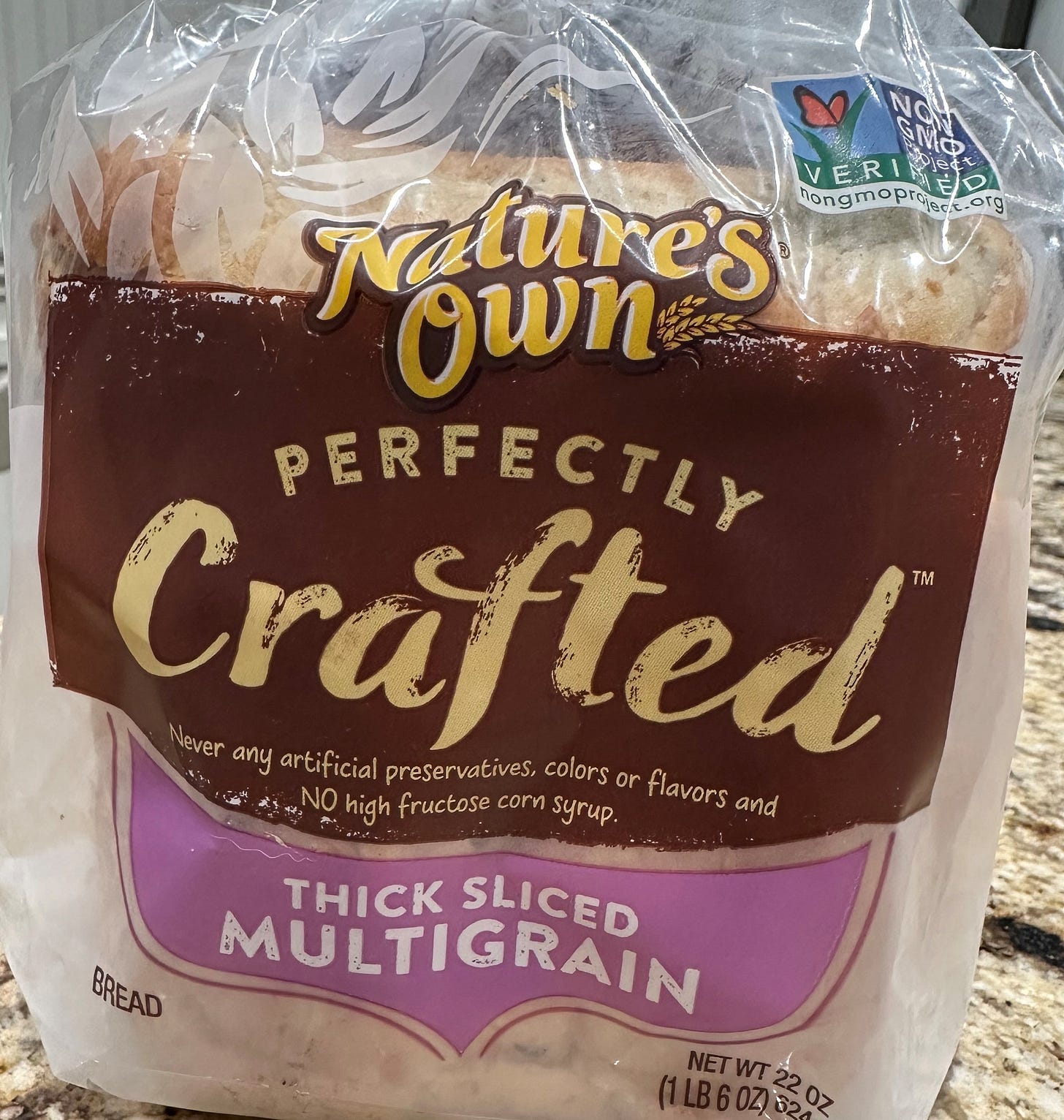Our region of the country got hit with over 15” of rain and 100 tornadoes in the storms just over a week ago. At various points, there were so many lightning strikes and tornadoes that it became impossible to track what was happening - you just had to hunker down and start praying. There was surprisingly little loss of life and property damage given the size of the storms, but that’s not to say there was none - thoughts and prayers for everyone impacted by these storms would be appreciated.
In many ways, it feels like a metaphor for our political world: There are so many tornadoes that it’s hard to focus on anything, let alone everything. Remember Signalgate? That was what, two weeks ago? But also a few scandals, Liberation Day, and a global financial near-meltdown ago.
On the positive side, they are finally going to solve the “autism epidemic” (sigh). 1
One of my frustrations with the current situation is the lack of good governance. You can wildly flail with your policy ideas, you can even have bad policy ideas, and still have the government serve its purpose of protecting and supporting its citizens. But you can’t have wild and/or poor ideas and bad governance: That always leads to a banana republic situation. My concern right now is that the crew in charge of the federal government is not good at governance. Indeed, often spectacularly bad at it, if all the stories are to be believed (sigh again).
On the positive side, we are experiencing much better governance at the state level, and people are noticing - ratings for governors and state legislatures are generally positive (often quite positive) across party lines (as I wrote this paragraph, the one governor with an underwater approval rating announced she will not run for reelection). So when people offer the cliche of “Americans just hate government,” I always think, “Except when they don’t.”
Why the state-federal difference? Probably because states can’t afford to have bad governance - there’s no one to come to the rescue if a governor and legislature, for example, raise sales taxes by another 10% and end up causing a recession. My students are tired of hearing me say it, but governance gets more pragmatic and less political as you move from the federal to the local level. It doesn’t get purely pragmatic and completely apolitical, just more than at higher levels.
Ruminating about all of this yesterday, I decided to visit the Asian pond area of the Memphis Botanical Gardens while running errands. The Asian gardens are one of my happy places, and I just sat there in the shade for a while, watching the people and animals do their thing (the koi are the size of large trout). A highlight of the gardens is a huge number of different Japanese maple species, which are especially vibrant as their leaves emerge in the spring, ranging from lime green to bright red to a dark magenta. The photo above is one of my favorites, whose red leaves just glow in the sun this time of year. I just love j-mapes, as we should all call them, because of their delicate structure, because of their coloring, and because - unlike people - a Japanese maple has never annoyed me. If the world is getting to you lately, do yourself a favor and go sit in the shade of a j-mape on a warm, slightly breezy day.
Please continue sharing this newsletter with friends. We hit over 2,000 reads last month!
Something Short
Moving the newsletter to twice per month means I won’t always have a fresh, short piece available to share (that would be a LOT of short pieces each year!). This issue you’re getting my thoughts about Indiana’s 2008-2012 education reforms, which I will work into a short piece eventually.
Back when I lived in Indiana, my team often interacted with Gov. Mitch Daniels and Supt. Tony Bennett’s teams as they implemented a suite of education reforms that were probably the most assertive in the nation (their many critics would say “the most aggressive”). A big pushback on many of their initiatives was that they “just won’t work.” Some of them didn’t, of course. But research is slowly catching up with those initiatives (most occurring from 2009-2012), with the latest study being this paper on third-grade retention.
The logic behind the retention of students not reading at grade-level is that reading is a foundational skill on which most other learning is based. If you socially promote a student into 4th grade without solid reading skills, you’re doing that child a major disservice. It’s hard to argue with that, but I was also familiar with the research on grade retention at that time, and it was not at all positive.
Although the Indiana leadership had a reputation among educators as being dogmatic and not open to debate, I never found that to be the case. To the contrary, I privately expressed concern about a number of their initiatives, and in response I usually found myself in a discussion with Dr. Bennett or one of his top aides.
Third-grade retention was an idea about which I raised concerns. Dr. Bennett talked to me at length about their thinking behind the retention policy. His main point was that their approach was a very focused strategy that devoted resources to those students who needed to read better. He had other arguments, but that main point is what tipped me from deep skepticism to mild skepticism (I’m a researcher, skepticism is my normally operating mode!).
Well, the new study provides evidence that the retention policy has increased student achievement, with few negative side effects. It’s a good lesson that sometimes even universally panned strategies have value if reconceptualized and implemented smartly.
But reading this study also got my wheels spinning about something else. One of our country’s major problems, IMHO, is our reluctance to hear people out. Back when I was in college, there was a big controversy in my fraternity, and the officers (including me) were getting hammered by a small, outspoken group. They annoyed the crap out of us, and we detested them. That is, until a neutral party pulled me aside and suggested I meet with a couple of the rebels. The ensuing conversation was three hours of difficult, frustrating conversation … but we found common ground and took the temperature down a few degrees. What I didn’t expect was to become the villain when I urged my fellow officers to hear out the rebels and try to find a win-win compromise (“You’re a traitor!”). As one veteran ed policy advocate once told me, “Forging a compromise doesn’t mean everyone loves you, it means everyone hates you equally” (I laughed, but she wasn’t joking).
That experience became highly relevant when Dr. Bennett was elected state superintendent. His team had a visceral, knee-jerk reaction to most university types, including me. After a few rough months, a mutual friend sat our teams down in the State House and asked us to find some common ground. It was only a 30-minute conversation this time, but it was just as difficult and awkward. The conversation turned when Dr. Bennett snapped at me, then I immediately snapped back (I heard my associate director, sitting right next to me, utter a sound that can only be described as a combination of a gasp and a whimper). We stared at each other for a few seconds, then he said, “That’s fair. Let’s work this out.” The tension in the room dissipated quickly, and we agreed to stop sniping at each other in public and to start talking regularly in private. We became private sounding boards for each other, which I honestly believe made both of our teams more effective.
Of course, the outcome back at my university was similar to my earlier experience: Some colleagues never talked to me again after they found out that I was in regular contact with a Republican. Keep in mind that this was in Indiana! How on earth could we make things better for children if we couldn’t talk to people in the dominant political party in the state?
All of this has been swirling in my mind as of late. Readers of this newsletter are no strangers to the fact that I fear the leaders of the current administration are unserious people causing long-term damage to the country. But you know what? Some of the people in the administration are really good human beings who are super smart and knowledgeable, and I’m talking to them. We don’t agree on everything, but we agree on some things that are critically important for helping children and their families. Will I lose some friends and colleagues when it gets out?2 Seems unavoidable. But worth it, in the end. We have to be able to talk to each other.
Something a Bit More Involved
An important body of research over the past few years has focused on estimating the number of students who are working above grade-level in school. Put in more practical terms, what percentage of fourth-graders start the school year already working at the fifth-grade level (or higher). In my experience, the percentage is far higher than people realize - including educators working with these students.
My colleagues Karen Rambo-Hernandez (Texas A&M) and Matt Makel (Univ. of Calgary), with their co-author Noah Koehler, recently published a study that tackles this question, and it’s a great piece of work. This study builds on previous research (of which I was a small part) published in 2023 and 2017. They examined achievement distributions pre- and post-COVID to look for trends.
The study had several interesting findings. It’s not surprising that the pandemic hurt learning, but Karen et al. found evidence that it hurt worse in math than English/ reading. Struggling students were more common than advanced students, but they found interesting patterns.
The big take-aways from this body of research are that (a) below grade-level students are more prevalent than above grade-level students, (b) but the prevalence of above grade-level students is substantial, and (c) students work above grade-level more often in English/reading than math.
This last point is very important and doesn’t get enough attention. In the 2017 study, we were initially surprised to see that advanced performers were less common in math than English and reading, mostly because math is often considered an easier subject in which to accelerate students. But researchers keep finding less advanced achievement in math, and my hypothesis is that it’s easier to “informally accelerate” a child in reading than math.
In other words, if you have a child who enjoys reading, it’s not hard to hand that child a more challenging book. If they enjoy that one, you reach for a similar or even more challenging book on your shelf. They can go to the library and grab something interesting from the stacks. On and on it goes. It’s not easy to do that for math, because of adults’ often limited competence, the lack of math materials lying around most homes, and the way we structure math learning in this country (i.e., you may be statistics or finance wiz, but do you remember your high school geometry course?).
From my perspective, this is another reason why all schools need to have advanced education programs. Study after study suggests that broad access to advanced opportunities benefits all students, but especially those students who may not have access to that “informal acceleration” at home or in their communities. We all benefit when every child has the opportunity to pursue advanced opportunities. Not all will, of course, but they should all have the option.
As always, if you want copies of any of these papers, just drop me a line.
Some Recent Things that Intrigued Me
University R&D is important. I’ve followed the career of Sen. Young (IN) for some time, having lived in the Hoosier state when he was first elected to the House (in our district). He is a smart person who fits the mold of “a senator,” someone who thinks independently and truly wants what’s best for his constituents. That’s not to say he isn’t partisan - he’s a American politician in the 21st century - but he often tries to find the center ground on tough issues (much like one of his predecessors, the late Senator Richard Lugar, who I greatly admired and loved working with). Sen. Young recently co-authored this op-ed that makes the case for the importance of university research funding.
Rick Hess’ DEI column. This piece can be a tough read at times, but that’s because it hits close to home. As someone highly involved in higher ed leadership over the past few years, I found myself to be highly conflicted as the DEI emphasis took hold: I strongly supported many DEI efforts yet was worried that advocates were taking things too far. The overextension struck me as risky because (a) it invited a backlash that would wipe out the DEI progress we were making and (b) it was starting to be used to deny opportunities to people of certain backgrounds. Rick is wrong, though, about when the backlash started, it wasn’t due to the pandemic. The year after George Floyd was killed (and let’s keep in mind that there were many other similar killings that year) kicked DEI initiatives into high gear (at least in higher ed and corporate spheres). The tide started to turn when critical race theory became a wedge issue during the fall 2021 Virginia governor’s race. Universities began pulling back on the use of mandatory diversity statements for job searches, and the political mood shifted. That was very late in the pandemic, so technically Rick is correct about the timing, but the backlash within universities didn’t gain momentum for years (and still hasn’t taken hold in many of them).
Podcast episode with Anne Stokke. I’m a big fan of Canadian math professor Anna Stokke, who shares my deep skepticism about lots of what passes for math education in K-12 schools. In a past issue, I shared a link to my discussion with Anna on her podcast, but she recently appeared on the AEI education podcast to talk about her work in more detail. Anna is smart, engaging, and thought-provoking, and that is certainly all on display in this discussion. Highly recommended!
Idaho news story. Although we’re seeing a countrywide movement away from the late 2010s-early 2020s trend of districts eliminating advanced education (from gifted programs to advanced coursework to ability grouping), the “eliminate opportunity to promote equity and advanced achievement” logic still exists. Here’s an example from Idaho. This trend still isn’t dead, folks.
We’ve been DOGE’d. It’s being widely reported that DOGE will likely cost the federal government money, as the savings will likely be far south of the new $150 billion estimate, and the revenue loss from gutting the IRS is estimated to be far north of $150 billion. Whoops. (See above, good governance matters).
IT’S THE PHONES. H/t to Noah Smith for calling attention to the following blog post. Well, it’s not just the phones, it’s the combination of phones and social media (which is designed to be addictive). We all suffer from it, but our young people, who are digital natives, are absolutely addicted. I have several friends whose late teen/early adult children are unquestionably addicted - they cannot put their devices down and suffer withdrawal symptoms if they do. This is a serious public health crisis, and we’re on the verge of intellectually losing an entire generation. See this column in the FT that provides similar thoughts from a different perspective, and this more colloquial take in the NYT. I don’t have a great solution, but getting phones out of schools feels like a good start.
Some Things I Found to be Cool
Poll results. Last issue’s poll was in response to the question “Should authors/writers/creators wrap things up when they create a complex mystery in their work?” 55% of you said “Absolutely!”, 27% said “usually,” and 18% said that it depends. 0% said “No!”, which was good, because “no” was the only incorrect answer.
“I’ll be your huckleberry.” Val Kilmer recently passed, and he was truly one of our great actors. I vividly remember Siskel and Ebert talking about the film Thunderheart, in which Kilmer plays a Native American FBI agent. Ebert concluded his comments by noting that he forgot Kilmer wasn’t really Jim Morrison when he watched The Doors, and he forgot Kilmer wasn’t really an Indian FBI agent when he watched Thunderheart. It was meant as the highest compliment. Heat, Tombstone, Top Gun, he made fun movies. RIP.
Don’t read this if you’re cutting carbs. Nature’s Own Perfectly Crafted Thick Sliced Multigrain Bread needs a better name (and some punctuation), but it is indeed perfectly crafted, thick-sliced, multigrain bread. This is the best bread you can possibly find outside of a bakery, and I’ve eaten plenty of bakery bread that weren’t as good as this grain-based perfection. Eating a sandwich? You can’t do better than this bread. Thinking about some toast? I promise you, if you toast this bread, YOU WILL NEVER EAT TOAST AT HOME MADE FROM DIFFERENT BREAD THE REST OF YOUR LIFE. I don’t know what our friends at Nature’s Own are doing here, but we should all hope they keep it up.
If you eat that toast with a little butter and some of your favorite preserves while sitting under a j-mape on a warm, breezy day, you may think you’re in heaven.
Dunkin’ is awesome. The new Dunkin’ ham and swiss pretzel sliders are delicious. They often don’t look as good as the PR photos, but they always taste good.
Holy crap. I knew talc was bad for us, but I didn’t realize how bad until listening to this Fresh Air episode about it. It’s so bad that you need to search your cupboards and closets to see if you have any products containing talc. If so, you have asbestos in your house, and even quick exposure to minute amounts can be dangerous. Wear a mask, put it immediately in a plastic bag, seal and toss it, then wash your hands vigorously.
The Hirshhorn Museum. I had time to kill late one afternoon in DC recently, so I decided to walk through the Hirshhorn for the first time. It was great! It’s not huge so doesn’t require a huge investment of time, and I loved the diversity of the collection and special exhibits. My favorite room was the Basquiat-Banksy exhibit, and the OSGEMEOS art was fun and something I’d never seen before. But the two best things were the view from the observation deck on the top floor and the following painting by Flora Yukhnovich. It is intended to evoke an 18th-century style but with a very modern twist (it was painted in 2022). The canvas is huge and was attracting a lot of attention as people walked through the room. It’s definitely something to see in person!
Jade Plant of the Month
This issue’s beauty is a traditional jade grown from a mix of cuttings from other, similar plants. It’s done quite well this summer and is showing great color and lots of new growth. With some direct sunlight and a touch of fertilizer, this green beauty will probably double in size. We’ll circle back to this one in September to see how it’s doing!


Where to Find Me
http://Amazon.com/author/jonathanplucker
www.linkedin.com/in/jonathanplucker
https://twitter.com/JonathanPlucker
https://www.threads.net/@jonathanplucker
We’ve had people studying this for decades. If the HHS study is honest (don’t hold your breath), they’ll find that it’s impossible to figure out completely, but it’s probably a combination of better identification and people having children later than in previous decades (from what I’ve read, it’s the father’s age that appears to be the issue, which feels counterintuitive to me). What we know with almost absolute certainty is that it has nothing to do with vaccines.
This essay would seem to be ill-considered, from this perspective.








Fascinating! Thank you for the insights!
Hi Jonathan,
Great blog! Thank you for mentioning the AEI podcast episode.
Regarding in-class acceleration for math, I think it's often non-existent. The attitude is often "you've finished the work today, so you can read a book or work on other subjects". Here's a crazy anecdote. My kids both went to French Immersion. My daughter and several other kids were bored in math class and always finished their work before other students. I asked the teacher if they could work on math contests during the math slot. This request was turned down (I think, by the principal) because the math contests aren't in French!
If you haven't already listened to it, I want to recommend my Math Academy episode with Justin Skycak and Alex Smith. One of my math prof friends has a subscription and worked it out with his son's school that he can work on Math Academy during math class (because his son is quite advanced in math). I think a good program like Math Academy would allow for better in-class acceleration. It's designed in such a way that independent learners can work through the units without much adult help. Their chief curriculum writer, Alex Smith, has a PhD in math.
Thank you for all your advocacy for advanced students (especially in math!). I will take a look at the papers you mentioned.